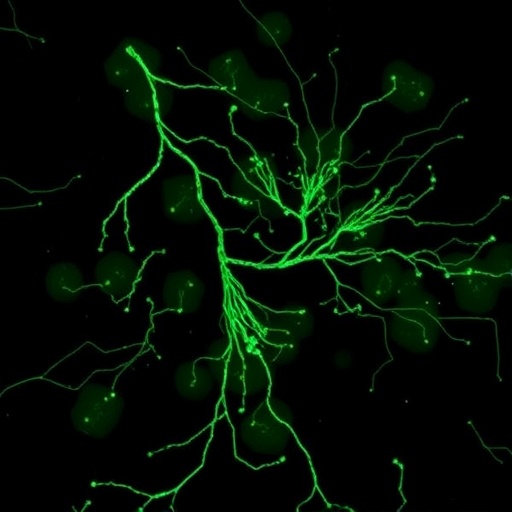In a groundbreaking study that sheds light on the complex interplay between the immune system and tumor microenvironments, researchers have unveiled the significant role of CD24a in modulating immune responses against tumors, particularly in the context of triple-negative breast cancer (TNBC). This research, articulated by Chan et al., published in the Journal of Biomedical Science, provides vital insights that could pave the way for innovative immunotherapies. The study illustrates how the knockout of the CD24a gene can enhance the capabilities of both macrophages and CD8⁺ T cells, leading to more effective anti-tumor responses in a murine model.
Triple-negative breast cancer is one of the most aggressive forms of breast cancer and is characterized by the absence of estrogen and progesterone receptors, as well as a lack of excess HER2 protein. This absence complicates treatment options and is known for its poor prognosis. Desperate need for effective therapies in the treatment of TNBC has galvanized researchers to explore the nuances of tumor immunology. The study by Chan et al. specifically focuses on CD24a, a cell surface glycoprotein that is typically overexpressed in various cancers, including breast cancer.
In their experiments, the researchers used genetically engineered mice lacking the CD24a gene to assess how this alteration affected the immune response to tumors. What they discovered was remarkable: the absence of CD24a significantly enhanced the recruitment and activity of macrophages and CD8⁺ T cells within the tumor microenvironment. This suggests that CD24a may act as a negative regulator of immune responses, providing a molecular target for potential therapeutic interventions.
The study meticulously examined key markers of immune activity, revealing a marked increase in pro-inflammatory cytokines in CD24a knockout mice compared to their wild-type counterparts. The enhanced cytokine profile correlated with a reduction in tumor burden, indicating that the immune system was more effectively poised to combat tumor cells in the absence of CD24a. The researchers also observed improved antigen presentation, which further stimulates T cell activation and proliferation.
Upon discussing these findings, Chan et al. emphasized the lasting implications of their work. The enhancement of macrophage and CD8⁺ T cell activity may not only impact tumor growth directly but could also alter the systemic immune landscape. In tumors where immune evasion is a hallmark, targeting CD24a could disrupt the mechanisms allowing tumor cells to thrive unimpeded by the immune system.
Additionally, the experiments conducted showcased the potential for combining CD24a targeting strategies with existing immunotherapies such as checkpoint inhibitors. The synergistic effects of this combination could significantly elevate the efficacy of treatment regimens for patients battling aggressive forms of TNBC. As research in this field continues to evolve, the focus is shifting toward understanding how such molecular pathways can be effectively manipulated for therapeutic gain.
Such major breakthroughs are not only essential in their local context but provide broader implications for cancer therapy. The modulation of immune checkpoints, particularly in cancers with immune evasion mechanisms, represents a frontier in oncology. CD24a, as illuminated by this work, presents a new frontier; functional inhibitors or monoclonal antibodies targeting CD24a might enhance the immune machinery, creating a more hostile environment for tumors.
Moreover, the findings denote an engaging narrative on the balance between immune activation and tolerance. The role of tumor microenvironments in dictating immune responses is increasingly appreciated. Understanding how CD24a contributes to these dynamics could lead to the development of novel therapeutic strategies that could one day be applicable beyond breast cancer, potentially altering the treatment landscape across various cancer types.
The significance of the study by Chan et al. cannot be overstated. As scientists strive for personalized medicine approaches in oncology, the elucidation of CD24a’s role offers insights that may inform the design of tailored immunotherapies aimed at enhancing the body’s natural defenses against cancer. It illustrates the remarkable complexity of the immune response and the necessity of fine-tuning these systems for optimal efficacy in tumor suppression.
In summation, the research underscores both the promise and challenge of targeting the immune responses in cancers characterized by intricate and exploitative immune evasion tactics. The future of cancer therapy may very well hinge on such insights. The hope is that further exploration into the mechanisms of CD24a will culminate in therapies that not only prolong lives but also provide cures for tumors that currently remain intractable.
As we look to the future of cancer treatment, it is essential to remain optimistic yet diligent. This study serves as a beacon guiding researchers towards new horizons in the battle against TNBC and potentially other malignancies. The path forward is clear: the ongoing investigation into CD24a and its functional role in the immune response will continue to revolutionize our understanding of cancer immunology and treatment paradigms.
This innovative research invites a multidisciplinary approach involving molecular biology, immunology, and clinical studies to translate these findings into actionable therapies. The prospects that arise from understanding and targeting molecules like CD24a could lead to substantial advancements in how we combat cancer, instilling hope for patients grappling with the complexities of malignancies.
Subject of Research: The role of CD24a in tumor microenvironment and immune response modulation in triple-negative breast cancer.
Article Title: CD24a knockout results in an enhanced macrophage- and CD8⁺ T cell-mediated anti-tumor immune responses in tumor microenvironment in a murine triple-negative breast cancer model.
Article References:
Chan, SH., Lin, CY., Tseng, HJ. et al. CD24a knockout results in an enhanced macrophage- and CD8⁺ T cell-mediated anti-tumor immune responses in tumor microenvironment in a murine triple-negative breast cancer model.
J Biomed Sci 32, 73 (2025). https://doi.org/10.1186/s12929-025-01165-3
Image Credits: AI Generated
DOI: https://doi.org/10.1186/s12929-025-01165-3
Keywords: CD24a, triple-negative breast cancer, tumor microenvironment, macrophages, CD8⁺ T cells, immune response, immunotherapy, cytokines, tumor burden.




